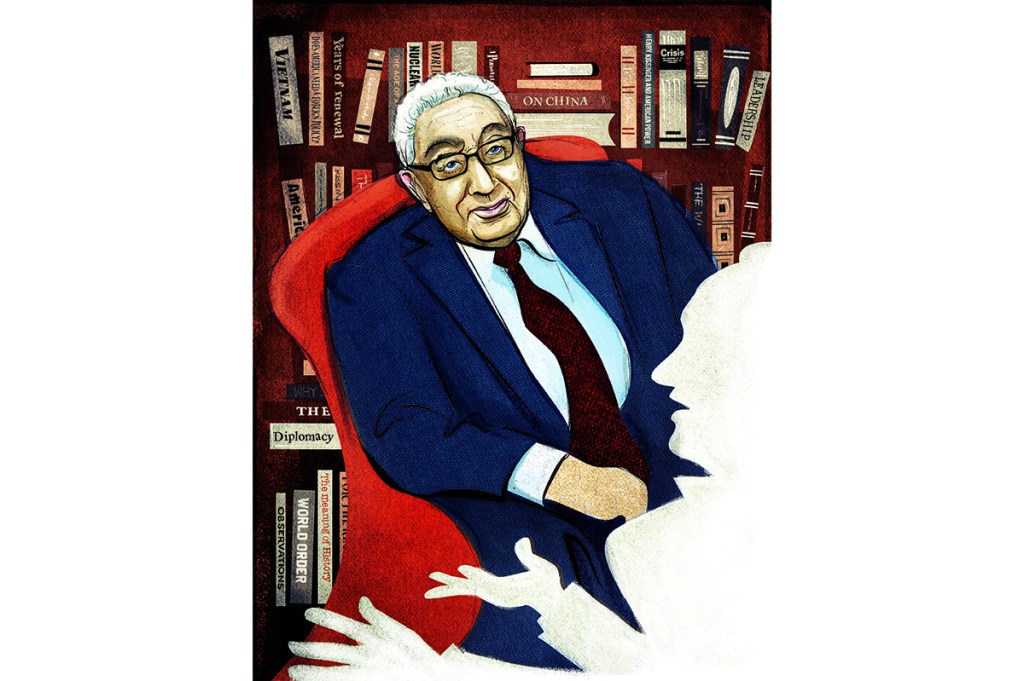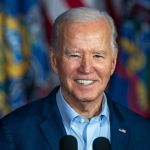Andrew Roberts: Henry, at Davos, you said the dividing line between Russia and Ukraine should return to the status quo ante because pursuing the war beyond that point could turn it into a war not about the freedom of Ukraine but into a war against Russia itself. You came under a good deal of criticism for that, not least from Mr. Zelensky. How is the world going to find a new equilibrium after this, however the war ends?
Henry Kissinger: The purpose of the Davos statement was to point out that the issue of war aims needed to be faced before the momentum of war made it politically unmanageable.
When Zelensky commented, he hadn’t read what I had said. In his most recent statements he has essentially accepted what I outlined in Davos. He gave an interview to the Financial Times [on June 7] which fundamentally accepted the basic framework.
The basic framework is this: there are three possible outcomes to this war — all three of them are still to some extent open.
If Russia stays where it is now, it will have conquered 20 percent of Ukraine and most of the Donbas, the industrial and agricultural main area, and a strip of land along the Black Sea. If it stays there, it will be a victory, despite all the setbacks they suffered in the beginning. And the role of NATO will not have been as decisive as earlier thought.
The other outcome involves an attempt to drive Russia out of the territory it acquired before this war, including Crimea, and then the issue of a war with Russia itself will arise if the war continues.
The third outcome, which I sketched in Davos, and which, in my impression, Zelensky has now accepted, is if the Free People can keep Russia from achieving any military conquests and if the battleline returns to the position where the war started, then the current aggression will have been visibly defeated. Ukraine will be reconstituted in the shape it was when the war started: the post-2014 battleline. It will be rearmed and closely connected to NATO, if not part of it. The remaining issues could be left to a negotiation. It would be a situation which is frozen for a while. But as we’ve seen in the reunification of Europe, over a period of time, they can be achieved.
AR: Could it be another North/South Korea kind of situation where it solidifies into seventy years of stasis?
HK: Well, we are talking about only 2.5 percent of the country and Crimea, which is another 4.5 percent, whose relationship to the region is different than that of the pure Ukrainian, because it has been Russian for hundreds of years. I won’t pass a judgment on what the outcome of a negotiation should be. But if the allies succeed in helping the Ukrainians in driving the Russians out of the territory they have conquered in this war, they will have to decide how long the war should be prolonged.
AR: But none of those three outcomes, Henry, really punishes Putin for his aggression, do they?
HK: Quite the contrary. If the war ends as I sketched at Davos, I think it will be a substantial achievement for the allies. NATO will have been strengthened by the addition of Finland and Sweden, creating the possibility of defense of the Baltic countries. Ukraine will have the largest conventional ground force in Europe linked to NATO or a member of it. Russia will have been shown that the fear that has hung over Europe since World War Two, of a Russian army descending — the conventional army descending into Europe across established borders — can be prevented by NATO conventional action. For the first time in recent history, Russia would have to face a need for coexistence with Europe as an entity, rather than America being the chief element in defending Europe with its nuclear forces.
Approaching China
AR: We’ve recently marked the fiftieth anniversary of your secret visit to China in February 1972, and you have been very deeply engaged with China ever since. How should the West deal with China today? What did you feel about the Trump administration’s confrontation policy with China?
HK: The United States since Trump seems to have been conducting its policy towards China on the principle that if you build alliances all around China, this will convince China to accept rules of conduct that were developed in the West.
But the approach of China is different from the European approach to policy. The European approach was created by relatively small countries that were mindful of the impact of the surrounding countries to them and, therefore, required constant adjustments of the balance of power.
The history of China over thousands of years is that of a country which is dominant in its region by a magnitude. This has created a style of foreign policy where they seek their influence through the scale of their achievement, the majesty of their conduct, reinforced where necessary by military force but not dominated by it. So a long-term policy with China needs two elements: one is sufficient strength, so that Chinese power is matched wherever it appears in a dominant way. But at the same time, a concept in which China can find itself treated as an equal and as a participant in the system.
AR: You don’t feel the Biden administration is doing that successfully at the moment?
HK: It seems to be trying to begin a dialogue. But the administration usually begins it with a statement of Chinese iniquities. The emphasis on the Taiwan issue will produce confrontation. I don’t know what will come out of the discussions that seem to be going on, but at the moment, I think we are stymied.
Nuclear options
AR: Do you think the Biden administration is doing a good job with the Iranian nuclear talks?
HK: I was extremely doubtful about the original nuclear agreement. I thought Iran’s promises would be very difficult to verify, and that the talks really created a pattern in which the nuclear buildup might have been slowed down a little but made more inevitable. As a result, countries in the region, particularly Israel — Iran’s chief enemy — but also Egypt and Saudi Arabia, whom they see as principal competitors — were going to be driven into reactions which might make the situation much more explosive.
Now, the trouble with the existing nuclear talks is that it is very dangerous to go back to an agreement that was inadequate to begin with — to modify it in a direction that makes it apparently more tolerable to the adversary.
So all the concerns I had with the original agreement, I’m going to have now. I haven’t seen the terms yet, but there is really no alternative to the elimination of an Iranian nuclear force. There is no way you can have peace in the Middle East with nuclear weapons in Iran, because before that happens, there is a high danger of pre-emption by Israel, because Israel cannot wait for deterrents. It can afford only one blow on itself. That is the inherent problem of the crisis.
AR: In our last Spectator interview in 2014, you mentioned cyberspace warfare as the next frontier. How serious a threat do you think it is now?
HK: I think the historically unique aspect of the contemporary world is that technology is now producing imperatives of confrontation, and of extreme capacity to destroy civilization as we understand it.
These complexities are enhanced by the fact that there is no experience of ever using these weapons. The combination of their destructiveness, and the autonomy of these weapons that have a capacity to choose their own target and a capacity to determine their own danger, imposes a necessity to limit their scope. But this is not taking place at this moment: there are no discussions between the high-tech countries. This is one of the principal tasks for the next phase of foreign policy that cannot be avoided. The only question is, will it happen after some disaster or before it?
History’s great leaders
AR: Your new book, published shortly after your ninety-ninth birthday, studies six extraordinary twentieth-century leaders whom you’ve known — Adenauer, de Gaulle, Nixon, Sadat, Lee Kuan Yew and Thatcher — and what you call their “world strategies.” Why these six and why did you decide to write a book about leadership now?
HK: I decided to write a book about leadership because I’ve spent my life in conjunction with individuals who were trying to shape events. I did so under conditions of great turbulence. Events must be interpreted, given a direction, and a technical and strategic meaning by leadership of the society. And so, I thought this could be done best through looking at the administrations of particular leaders. I chose these six because I had the opportunity to observe each of them in action and participate in some of their actions — sometimes on the policy level and always on the discussion level. It seemed to me that if one wants to understand what is needed to shape the events a society encounters in a constructive or helpful way, an illustration of leaders is a good way to understand it.
AR: You were in Germany as part of the US Army at the end of 1945 and saw at first hand the catastrophe that the Nazis had brought about. Adenauer, in your telling, is the man who more than any other brought Germany back into the community of nations after the war by what you call a “strategy of humility.” What did you mean by that?
HK: Normally, leaders have some elements of a society that they can build on. But Adenauer became chancellor of Germany at a moment when the social, political and philosophical structure had collapsed completely, when the country was under occupation. And when, moreover, in the experience of modern, national Germany, there were no successful models which he could follow to establish his authority. And so he started as close to zero as one could.
He brought a disjointed society back on the basis of democracy. It was a strategy of humility, in a sense.
At the end of the Napoleonic Wars, Talleyrand took over the foreign policy of a country that had been defeated but remained an entity and could appear as an equal to the other states in diplomatic relationships. In contrast, when Adenauer took over Germany, he had to establish the country as a moral equal to the other states it was dealing with. For that he had to accept its partition, the dismemberment of some of its industries, and the gradual creation of its democratic institutions. He had to do that in an atmosphere where some elements of traditional nationalism still existed, and where, paradoxically, the Social Democratic Party — which had been among the most positive elements in Germany in the previous period — decided they would affirm that supposed national purpose.
So he had to construct a state, and legitimacy within the country, and acceptance by the other European societies. He did that through his personality, through his strength, and, paradoxically, through his humility. In one of the debates in the German parliament, he shouted: “Who do you think lost the war?” Which is not what leaders usually say!
AR: You had several extraordinary encounters with Charles de Gaulle, a great but impossible figure. You say that he restored the grandeur of France, both during World War Two and as president, by “the strategy of will.” Was he a genius or just infuriating, as Churchill and Roosevelt found him?
HK: De Gaulle emerged gradually as the leader of a country, after the military collapse of France, by arriving in England without money, without a political structure and without the language. His leadership of the so-called “Free France” was established by Churchill saying to him: “You are alone and I am alone, so I might as well recognize you.” On this basis, he built an image — and it wasn’t just an image, it was his profound conviction — that he incarnated a greatness of France that had once been its distinguishing feature.
He was being subsidized totally by British funds at the very beginning of negotiations, which he accepted only as a loan and insisted on repaying at the end of the war. From the very beginning, he established the principle that, while he would accept overall British leadership, the strategic positions of France would be made by Frenchmen.
It was madly irritating, because Churchill accepted this but Roosevelt never did. Roosevelt always dismissed de Gaulle as a self-serving leader, which he was not, because his great achievement was that he managed to incarnate the greatness of France in a conduct that made him the dominant feature.
Upon his return to France, there were large forces that had conducted the resistance, there were established parties, and he was unknown on French soil. At first people didn’t recognize him because they knew him only as a voice on the BBC. But he had established a moral authority of such a nature that he could arrive in Paris and in effect take over the government without explicitly asking for it.
Then he had the inner strength to resign within about a year of having achieved what he had fought for, and suffered for, because he thought the basic direction of the constitutional evolution would return France to some of its divisions.
He was then in exile for thirteen years and came back and managed to solve the Algerian problem and to establish France — through his insistence on a nuclear capacity for France — as an equal of Britain, albeit without the same feeling of a “special relationship” with America. That was a spectacular performance. French foreign policy is still heavily shaped by Gaullist traditions.
Memories of Nixon
AR: Of all the six, the one who you worked mostly with, of course, was Richard Nixon. In the book, you give a generally sympathetic portrait of him, concentrating on his foreign policy, but you are also pretty clear about his character and his flaws. What was he like as a person?
HK: I didn’t know Nixon when he appointed me, which in itself was remarkable because for the fifteen preceding years I was the principal foreign policy advisor to Nelson Rockefeller, who was the main opponent to Nixon. Nixon was a man of considerable intelligence, considerable courage, who spent some time on reflection.
At the same time, he had a sense of personal insecurity vis-à-vis any group of people he had to deal with, which caused him in the execution of his office to issue his principal orders indirectly through emissaries, or through written documents. And so in private conversations with him one could never tell totally what reservations he might have that he did not express in order to avoid the face-to-face confrontation.
But he was very decisive. If he was in a prepared setting in which he had laid down in his mind the outline of what he wanted to achieve, Nixon could be very effective. In the give and take of opinions within the administration, it was the most unique form of government that I ever served in. It was an effective performance, but there was a gap on the human level. It was a gap of transmission, not a gap of perception.
AR: What do you think Nixon achieved geostrategically?
HK: When he came into office there were 500,000 Americans in Vietnam and 50,000 in transit. He felt the mental, political and strategic problem was how to withdraw these people without betraying the individuals in the region that had risked their lives by throwing their lot in with democracy. So the only real issue for Nixon and me in the Vietnam War was whether we were able to withdraw these forces under conditions in which the noncommunist part of Vietnam was given a real political opportunity to sustain itself. In my opinion, he achieved this and then it collapsed not in Vietnam, but in Washington as a result of Watergate.
Secondly, Nixon conceived the idea that when you have two adversaries, China and Russia, one should attempt to see whether one could discover their disagreements and, therefore, introduce China into the global political system. And whatever has happened since, for a two-decade period we were closer to each of them than they were to each other, which therefore forced each of them to consider their rivalries with their ideological partner.
Third, in the Middle East, he managed to split up the peace process, which had been considered a unified effort, into a step-by-step approach out of which a series of peace agreements emerged. This let America play the sort of role that Britain had played before the Suez crisis, as the shaper of policy. By the end of his term, America had played a leading role.
So he was a strong advocate of American defense, but he was at the same time a supporter of arms control negotiations because he wanted to keep current the need to deal with a capacity to destroy humanity. And he also wanted to use these negotiations as a means to educate the adversary, but the precondition of it was great determination when challenged. So he had the courage to put our forces on alert in the Jordan crisis of 1970 and in the Middle East crisis of 1973. He conducted a policy in the India/Pakistan crisis in the face of almost universal hostility, on the principle that he did not want the Soviet Union to appear as a key country in South Asia. Even though for a temporary period that put us in opposition to India, it was the precondition, as we told India during that crisis monthly, that after the crisis was over, we recognized that India was the major national country in the region.
Hemingway and the future
AR: Konrad Adenauer once asked you whether you thought that great leadership was possible today. He said that back in 1967. Can I ask you the same question: do you see any leaders now of the stature of the six people you write about?
HK: All the pressures of modern political activity are so consuming that the long-range thinking and lived sense of history that for Churchill was second nature is almost impossible to arise. I can’t cite a current example of a western leader who embodies it. That is a great danger, because it means that any demagogue who can exploit immediate resentments can achieve a disproportionate influence. It is the biggest problem for the future of democracy. Great leaders have to understand their society and believe in it. But they also have to be able to transcend it, to point society from where it is to where it has never been.
AR: Your book is full of very memorable phrases and aphorisms: who have been the greatest influences on you as a writer?
HK: As you can tell from our conversation, I’ve been very impressed by Churchill and de Gaulle in expressing myself. I am more influenced by Hemingway, though, because I like to cut attributes down and to try to express what I say as sparsely as possible. The ability to evoke the complexity of human motivations is one of the complexities of faith. That is one of the tasks of writers on history.
AR: How do you think history will view you, Henry?
HK: I really haven’t thought about that because my life has had a disjointed pattern: it did not go in a straight line from where I started to where I wound up. It never occurred to me as a teenager that I would be secretary of state someday.
I am, by instinct, a supporter of a belief that America — with all its failings — has been a force for good in the world and is indispensable for the stability of the world. It is in that region that I have made my conscious effort. My efforts constantly have been concentrated on learning about notions of diplomacy and history overlaid by a deep gratitude to a country that made it possible for my family to come there.
It is also in the face of the changes that are coming through in technology and AI that will dictate what the historic view will be a hundred years from now.
AR: I have only got one more question for you and that is: you’re only ninety-nine, what’s your next book going to be about?
HK: I usually go through a three-year phase after I finish one before I complete another. At this moment, I am reflecting on a number of issues, and I’ll have a better answer to your question a year from now.
How is it with you? Are you at the end of a project or starting your next work?
AR: No, I’ve got a mortgage, so I’ve got to get on with the next book almost before I finish the last one, Henry. Well, thank you so much for your time.
This article was originally published in The Spectator’s August 2022 World edition.


















